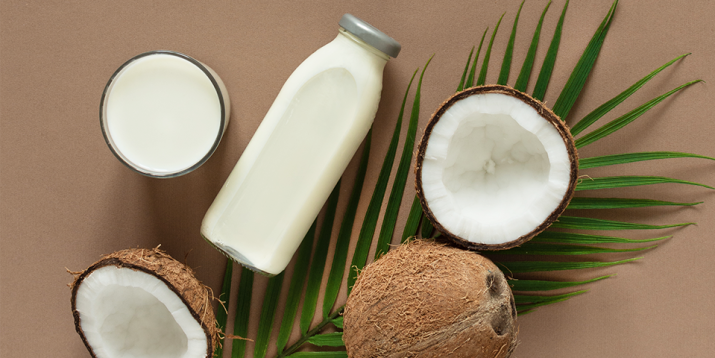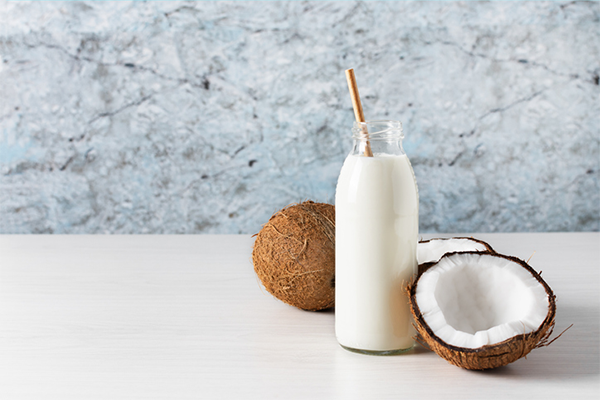7 Benefits of Coconut Milk

If you’re looking for a dairy-free milk alternative, you’ve got plenty of options to choose from — like soy, macadamia, oat, almond, cashew, and rice milk, just to name a few. But coconut milk benefits in particular have been getting a lot of attention recently.
So what exactly is coconut milk? There are two products that go by this name, so it’s helpful to understand the difference:
- Traditional coconut milk (also known as coconut cream) is made by soaking grated coconut flesh from mature coconuts in hot water and then straining out the solids. This produces the thick-and-creamy canned coconut milk often used in desserts, soups, and sauces.
- Coconut milk beverage is produced by adding water, sweeteners, and stabilizers to traditional coconut milk. The flavor and consistency is similar to low-fat milk, and it’s typically packaged in cartons and marketed as a dairy substitute. (This is the type of coconut milk you’ll see on the menu at Starbucks.)
The coconut milk benefits listed below refer to the coconut milk beverage. It’s important to note that coconut milk doesn’t provide protein and isn’t a 1:1 alternative to regular milk.
You’ll also want to be sure to choose a coconut milk beverage that’s fortified with calcium and vitamin D, much like regular milk would be.
So is coconut milk good for you? Is it healthier than regular milk? Before you decide whether to stock your fridge, let’s get clear on all the coconut milk benefits.
1. It’s Plant-Based and Dairy-Free

This may seem like an obvious benefit, but it’s an important one! Coconut milk offers another delicious non-dairy alternative for people who follow a plant-based diet or cannot tolerate dairy.
Like other plant-based milk alternatives, coconut milk is also a relatively eco-friendly option with a smaller carbon footprint than dairy.
If you’re going to drink coconut milk every day, opt for the beverage version. Canned unsweetened coconut milk can be quite high-calorie with 420 calories per cup, whereas unsweetened coconut milk beverage contains 40 calories per cup.
2. It Provides Healthy Fats
Coconuts are a natural source of medium-chain triglycerides (MCTs), a type of fatty acid believed to benefit overall health and help increase energy expenditure and support a healthy weight, says Emily Tills, MS, RDN, CDN.
And while saturated fat does make up most of fat content of a coconut, that doesn’t mean coconut milk nutrition should be lumped in with butter or bacon. Lauric acid is the type of saturated fat in coconuts and coconut oil, and it may have some heart-healthy benefits.
3. It’s Lower in Carbs Than Other Plant-Based Milks
While the exact carb count may vary a bit by brand, coconut milk generally contains fewer carbs than other dairy alternatives.
Unsweetened coconut milk has 1 gram of carbohydrates per one-cup serving. The same amount of unsweetened oat milk has 14 grams, while unsweetened rice milk has as much as 22 grams per cup.
This makes coconut milk a good alternative for anyone who needs to control their carbohydrate intake, Tills explains.
4. It May Be Easier to Digest

Some people have issues digesting milk, even if they’re not lactose intolerant. If that applies to you, substituting coconut milk for dairy may help you sidestep these issues.
And coconut milk may be a bit gentler on your stomach than other nut-based milks thanks to the medium-chain fatty acids, which is “an easily digestible fat that is often well tolerated in individuals who might have trouble digesting other fats,” says Dana Hunnes, PhD, MPH, RD, a senior dietitian at the Ronald Reagan UCLA Medical Center.
5. It’s a Good Source of Potassium
You’ll get 310 mg of potassium in one cup of unsweetened coconut milk — nearly as much as a banana, which delivers 451 mg per serving and has a reputation as a potassium powerhouse.
This nutrient is a type of electrolyte that’s crucial to nearly every function of the body, including your heartbeat, muscles, and nerves.
6. It May Support Immune Health
Coconut milk has antioxidant-like properties which may help support a healthy immune system, Hunnes says. And research suggests the lauric acid in coconut may also provide some benefits for healthy immune function.
7. It Adds Flavor to Your Recipes

Last but not least, let’s talk about one of the most important coconut milk benefits: It’s delicious! Some dairy alternatives don’t taste like much, especially if you buy the unsweetened kind. Coconut milk, though, is packed with flavor.
Take full advantage of that by using coconut milk in a protein shake recipe, like our Coconut Macaroon Shakeology and Chocolate Coconut Smoothie. And because coconut milk lacks protein, this is a great way to enjoy this dairy alternative while still boosting your protein intake for the day.
